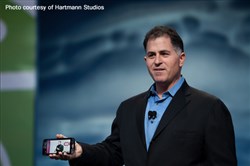VOL. 37 | NO. 7 | Friday, February 15, 2013
Reduced Midstate role lessens impact of Dell move to buy back stock
By Brandon Gee

Dell Inc. founder Michael Dell’s $24B plan to, along with the investment firm Silver Lake, take the company private should have little affect on what is left of Dell’s Middle Tennessee operations.
It’s hard to say what impact the planned $24 billion leveraged buyout of Dell will have on the computer giant’s Middle Tennessee operations, a Morningstar analyst says.
But one thing is for sure: Any potential impact has been lessened because Texas-based Dell already has reduced operations in both Davidson and Wilson counties over the past several years.
“Dell employs approximately 1,800 people in Nashville, primarily sales and technical support personnel,” company spokesman David Frink says.
That’s down from more than 3,500 employees as recently as 2006, when Dell’s Middle Tennessee operations included a 260,000-square-foot desktop computer manufacturing facility in Lebanon, a 360,000 square-foot office facility on the Nashville campus housing Dell’s technical support call center and sales operations, and a 250,000 square-foot fulfillment center servicing customers in the eastern U.S.
At the time, Dell claimed to have invested more than $250 million in its Middle Tennessee operations and to have donated more than $3 million to local schools, libraries and nonprofit organizations since 1999, when Nashville, under the leadership of former-mayor-then-governor Phil Bredesen, approved a $166 million incentive package to lure the company.
Contraction followed, however, with the 2009 sale of the Lebanon factory to GENCO and the 2010 transfer of ownership of Dell’s Nashville fulfillment center to CEVA Logistics.
The Nashville Area Chamber of Commerce still lists Dell as the region’s 12th largest employer with 2,500 employees. But by updating that figure to the 1,800 Frink supplied, Dell drops out of the top 20 in the Chamber’s rankings.
Dell is advertising jobs in Tennessee, 17 in Nashville and two in Memphis.
The leveraged buyout could pose a concern for the local economy as a desire to make structural and organizational changes without public disclosures and shareholder oversight is a common motivation for taking a public company private.
“It wouldn’t be surprising to see them lose some jobs,” says Hans Stoll, professor of finance and director of the Financial Markets Research Center at Vanderbilt University’s Owen Graduate School of Management.
“They’ll want to make it super-efficient and perhaps do some restructuring to make it a more profitable entity. That’s a good thing. Sometimes a company gets old and lazy.”
In an improving economy, Stoll adds, any lost Dell jobs in Nashville are likely to be replaced.
A news release announcing the planned deal offered few hints of future plans: “I believe this transaction will open an exciting new chapter for Dell, our customers and team members,” founder, Chairman and CEO Michael Dell said in the statement.
“We can deliver immediate value to stockholders, while we continue the execution of our long-term strategy and focus on delivering best-in-class solutions to our customers as a private enterprise. Dell has made solid progress executing this strategy over the past four years, but we recognize that it will still take more time, investment and patience, and I believe our efforts will be better supported by partnering with Silver Lake in our shared vision.”
Michael Dell and investment firm Silver Lake Partners will take Dell private, pending shareholder approval, using their own cash and equity and with the help of cash invested by MSD Capital, a $2 billion loan from Microsoft, rollover of existing debt and debt financing from BofA Merrill Lynch, Barclays, Credit Suisse and RBC Capital Markets, according to the news release.
Morningstar analyst Carr Lanphier notes that since the buyout is being led by Michael Dell and is not a hostile takeover by outsiders, changes might be less dramatic. Lanphier says the company is going private because Dell and his partners believe the company is trading beneath its inherent value due to public scrutiny and short-term pressures, namely, the company’s exposure to the hardware and personal computer market at a time when consumers increasingly prefer mobile and tablet devices.
“Those sales have been ticking down, so Dell’s profitability is going down,” says Lanphier, who noted Dell stock is trading near 10-year lows. “There’s growing interest by shareholders to do something about that.”
While going private raises questions, there actually could have been more risk to communities, like Nashville, where Dell is a major employer if the company had stayed public.
“I don’t think it’s one way or the other,” Lanphier said when asked if such communities should be concerned. “It was difficult to tell where shareholders wanted to go. … The share price was being crushed due to the perception that it’s going to go under if it stays in the PC market.
“They (Dell and Silver Lake) think that this valuation doesn’t make sense. … (Going private) gives them long-term flexibility, which might not have been palatable to investors. They’re taking this private to make the decision to keep their hardware products or not.”